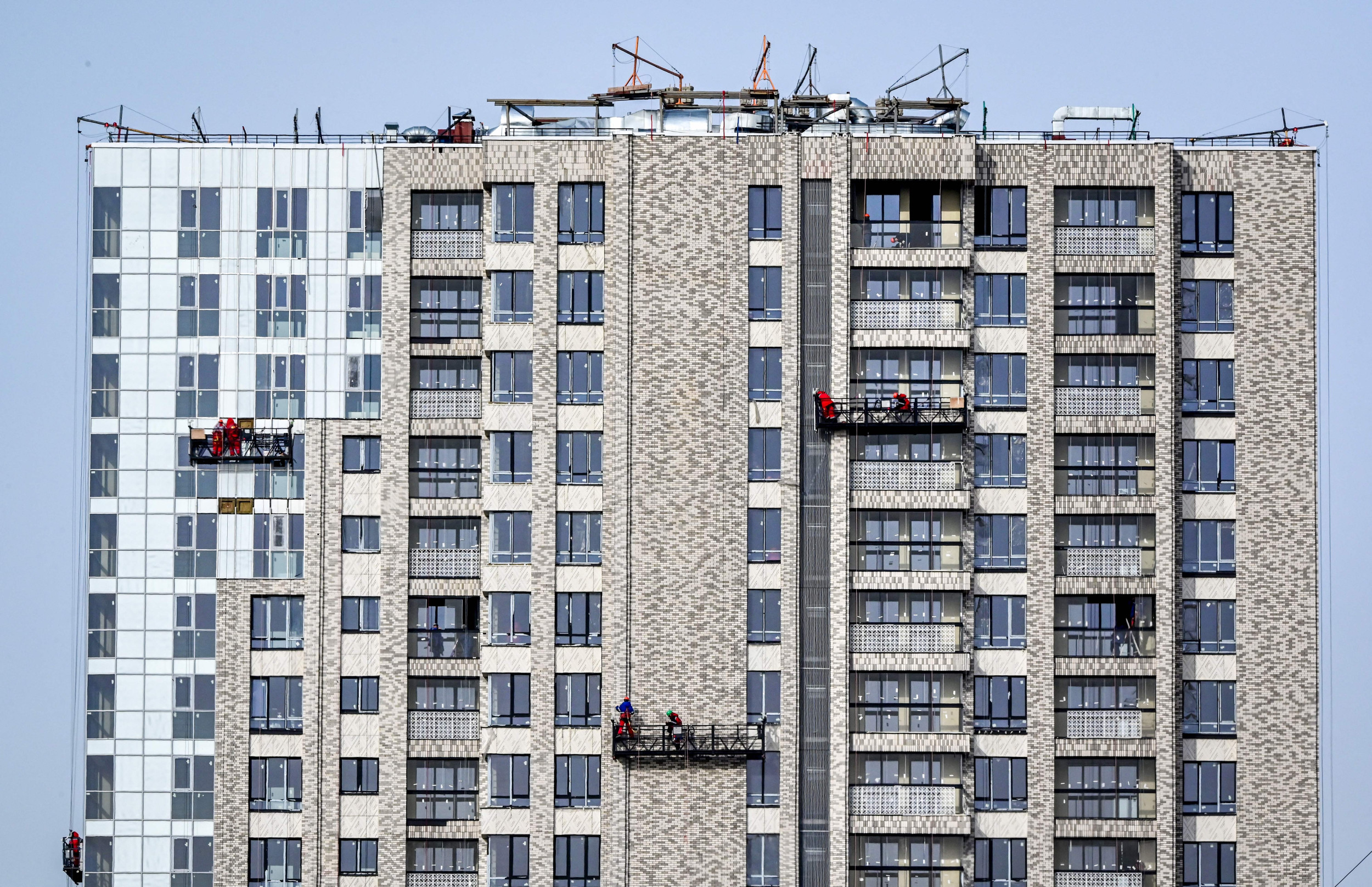
Nearly one-third of real estate developers in Russia could soon be facing bankruptcy, in part due to sanctions stemming from Moscow’s invasion of Ukraine, according to an assessment by Kyiv.
Newsweek reached out to Russia’s Finance Ministry for comment.
Why It Matters
Russia’s housing sector is a bellwether for the country’s broader economy, which has been buffeted by sanctions, worker shortages and high interest rates.
The construction sector is a major employer, and its decline threatens to ripple across the rest of the economy, posing a political problem for the Kremlin, which has tried to present the war it started as not hitting the pockets or lifestyles of Russian citizens.
 Workers in fenced cradles finish the wall of an apartment building under construction in Moscow on March 28, 2023. Workers in fenced cradles finish the wall of an apartment building under construction in Moscow on March 28, 2023. YURI KADOBNOV/Getty Images
Workers in fenced cradles finish the wall of an apartment building under construction in Moscow on March 28, 2023. Workers in fenced cradles finish the wall of an apartment building under construction in Moscow on March 28, 2023. YURI KADOBNOV/Getty Images
What To Know
Falling sales and high interest rates have pushed around one-fifth of developers toward bankruptcy, and this number could increase to 30 percent soon, according to Ukraine’s Foreign Intelligence Service.
This echoes a warning by Russia’s deputy prime minister last month about the impact of the high interest rate set by the country’s central bank.
But Ukraine’s foreign service said Russia’s construction industry also faces the problems of low demand, limited state support, and the outflow of resources to the war against Ukraine.
In a statement issued Monday, Ukraine’s Foreign Intelligence Service said that due to falling sales and high interest rates, nearly 20 percent of developers in Russia were nearing bankruptcy, and this figure could soon increase to 30 percent.
It said that those firms most at risk were in the mass-housing segment that depended on mortgage demand, and that developers are postponing completion dates.
This assessment aligns with comments by Russian Deputy Prime Minister Marat Khusnullin last month, who stated that 20 percent of property developers were at risk of bankruptcy due to high mortgage rates, a level that could rise above 30 percent.
Low demand, limited state support, and resources going to the war against Ukraine are taking their toll with declining sales, growing debt burdens and construction projects being frozen.
In June, Russian banks rejected over half (50.6 percent) of mortgage applications, including those from borrowers with impeccable credit histories—the real cost of a mortgage, including insurance and commissions, is at least 25 percent per year, according to the Ukrainian analysis.
In July 2024, the Russian government ended its preferential mortgage program, which had kept rates artificially low at 8 percent over the previous four years.
This led to a boom in the real estate and construction sectors, which helped maintain employment and boost growth—a boon for Russia following the Western-led sanctions imposed at the start of the war.
However, Khusnullin told Vedemosti in August that since this program ended, 80 percent of mortgages have been issued under targeted government initiatives, such as those for families with children, and only 20 percent on market terms.
Russia’s Central Bank (CBR) has focused on tackling inflation, which had been rising due to the economy being hit by high government spending on the military and a worker shortage.
The key interest rate had peaked at 21 percent, although it has since fallen, with the CBR lowering it last week to 17 percent, but this still makes home loans tough to afford for most Russians.
“Such interest rates put pressure not only on households, but also on businesses,” Ukraine’s Foreign Intelligence Service said.
Nine of Russia’s 20 largest residential developers saw significant revenue drops in the first half of 2025, according to consulting firm Macon, citing figures from the state housing agency Dom.RF.
Sales at YugStroyInvest fell 45 percent year-on-year to 29 billion rubles ($348 million), GK Tochno’s revenue dropped 43 percent to 10 billion rubles, and Setl Group’s income slumped by 41 percent.
Vasily Astrov, an expert on the Russian economy, told Newsweek that the problems the sector faces are a reflection of excessively tight monetary conditions, which suppress credit expansion, including mortgage lending. The termination of subsidized mortgages last July is another factor.
However, he said high interest rates are only indirectly related to the war economy.
This is because while military spending has overheated the economy, the CBR chose to fight inflation by all means, even at the expense of faltering economic growth and the rising risk of bankruptcies, he added.
What People Are Saying
Ukraine’s Foreign Intelligence Service: “The industry is suffering from low demand, limited state support, and the outflow of resources to the war against Ukraine.”
Russia’s Deputy Prime Minister Marat Khusnullin told Vedemosti in August: “About 20 percent of developers face serious risks…if the [CBR] high key rate continues, if money doesn’t flow into the sector, if citizens stop investing in real estate and if there’s no mortgage support, the share could exceed 30 percent.”
Vasily Astrov, from the Vienna Institute for International Economic Studies, told Newsweek thatthe problems the real estate sector faces are “a reflection of the excessively tight monetary conditions, which suppress credit expansion.”
What Happens Next
Calls for the CBR to cut the key interest rate further are likely to continue, with German Gref, the CEO of Sberbank, calling for it to be lowered to 14 percent by the end of the year last week.
However, annual inflation at 8.1 percent is still well above the 4 percent, which could stall further rate cuts, adding to the construction sector’s woes.
Update 9/16/25, 10:16 a.m. ET: This article was updated with comment from Vasily Astrov.
0){let uncommonKnowledgeContainerHtml=’
Uncommon Knowledge
Newsweek is committed to challenging conventional wisdom and finding connections in the search for common ground. ]]>






